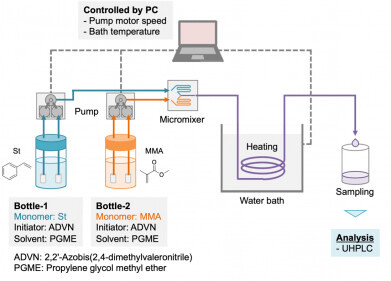-
.jpg) Canadian Light Source synchrotron floor
Canadian Light Source synchrotron floor
Research News
Expanding the scope of antivirals
Feb 26 2024
Improving antiviral medication is the goal of researchers from the University of Alberta (U of A) who are working on the only oral antiviral approved for COVID-19 infections in the hopes of expanding its use in populations that need it most.
Paxlovid, originally designed by Pfizer, uses a second drug as a metabolic booster to keep the active drug that targets COVID in the blood stream longer. However, this additive can interact with other medications, so immunocompromised people and people with chronic conditions can't take it.
“If you’re taking medications for a cardiac disorder for example, you would not be able to take Paxlovid, so we need to develop second-generation antivirals that could be taken by people that are on other medications, such as those who are immunocompromised,” said Joanne Lemieux, professor of Biochemistry at the U of A.
Lemieux’s team turned to the Canadian Light Source (CLS) based at the University of Saskatchewan (USask), where they were able to visualise the drug’s molecular structure in great detail, enabling them to find areas that could be modified.
“The CLS is indispensable to our team,” says Lemieux. “Synchrotron technology is an extremely valuable tool for us, especially for small molecule work.”
Following the visualisation process, Lemieux and her colleagues have been able to modify a specific area of the molecule in the active drug that enables it to stay in the system – meaning an additional “booster” drug is not necessary. This could help widen the use of the drug and allow more people to safely treat their COVID infection.
“We decided to explore an area of the molecule that, if modified a little bit, keeps the drug’s potency but alleviates its shortcoming,” says Alexandr Belovodskiy, Research Associate at the University of Alberta Applied Virology Institute.
Lemieux and her colleagues are continuing their work on novel antiviral drug design to help combat various viruses — from the common cold to other emerging respiratory viruses that could impact human health.
“The CLS synchrotron facility is an essential tool needed to continue the work on antiviral drug discovery in Canada,” added Lemieux.
The team’s findings were published in ACS Bio & Med Chem.
More information online
Digital Edition
Lab Asia 31.6 Dec 2024
December 2024
Chromatography Articles - Sustainable chromatography: Embracing software for greener methods Mass Spectrometry & Spectroscopy Articles - Solving industry challenges for phosphorus containi...
View all digital editions
Events
Jan 22 2025 Tokyo, Japan
Jan 22 2025 Birmingham, UK
Jan 25 2025 San Diego, CA, USA
Jan 27 2025 Dubai, UAE
Jan 29 2025 Tokyo, Japan


















